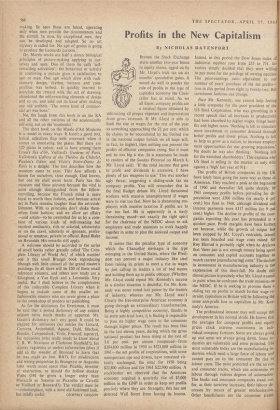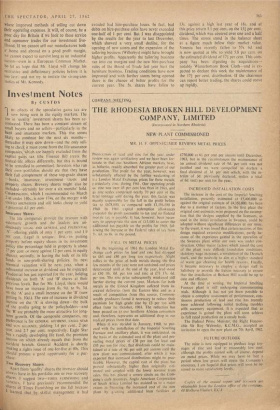Profits in the New Capitalism
By NICHOLAS DAVENPORT
BEFORE the Stock Exchange starts another two-year boom in equity shares, egged on by
Mr. Lloyd's trick tax on six months' speculative gains, it would do well to ponder the
/*I role of profits in the type of
capitalist economy the Chan- cellor has in mind. As we all know, company profits are a residual figure obtained by subtracting all proper expenses and depreciation from gross revenues. If Mr. Lloyd is able to limit the rise in wages for the rest of the year to something approaching the 2+ per cent. which he claims to be necessitated by his limited rise in the national output (which we all hope will, in fact, be higher), then nothing can prevent the profits of efficient companies rising. But it must not be too big a rise. In a statement he made to readers of the Sunday Pictorial on March 4, Mr. Lloyd said: 'If the total income that goes to profit and dividends is excessive, I have plenty of tax weapons to use.' This was another ugly threat, suggesting a sliding-scale tax on company profits. You will remember that in the final Budget debate Mr. Lloyd threatened workers with massive unemployment if wages were to rise too fast. Now he is threatening em- ployers with massive taxation if profits are to rise too fast. He is apparently in a nasty threatening mood—not exactly the right spirit for the chairman of the NEDC about to ask employers and trade unionists to work happily together in order to plan the national output and income.
It seems that the peculiar type of economy which the Chancellor envisages is the type emerging in the United States, where the Presi- dent can prevent a major industry like steel from raising its prices to meet a rise in wages by just calling its leaders a lot of bad names and holding them up to public obloquy. (Whether Mr. Lloyd could repeat Mr. Kennedy's success in a similar situation is doubtful, for Mr. Ken- nedy was never voted into power by the leaders of industry, whereas our Mr. Lloyd was!) Clearly the free-enterprise American economy is going through an extraordinary transformation. Being a highly competitive economy, thanks• to its stern anti-trust laws, it is finding it impossible to pass on higher wage costs to the consumer through higher prices. The result has been that in the last eleven years, during which the gross national product has been rising at the rate of 5.6 per cent. per annum compound—from $284,600 million in 1950 to $521,000 million in 1961—the net profits of corporations, with some unimportant ups and downs, have remained vir- tually unchanged, the total for 1950 being $22,800 million and for 1961 $22,900 million. A stockbroker wit observed that the American economy required a quarterly rise of $5,000 million in the GNP in order to keep net profits precisely where they are. Strangely, this has not deterred Wall Street from having its booms. Indeed, in this period the Dow Jones index of industrial equities rose from 235 to 731. In- vestors simply decided that they were willing to pay more for the privilege of owning equities. The price-earnings ratio—equivalent to out number of years' purchase of the net profits— rose in this period from eight to twenty-two. But investment fashions can change.
Pace Mr. Kennedy, one cannot help feeling a little sympathy for the poor president of the US Steel Corporation, who was grumbling in a recent speech that all increases in productivity had been absorbed by higher wages, fringe bene- fits and higher taxes. 'Nothing is left to stimulate more investment or consumer demand through better profits and lower prices. Nothing is left' to help us grow as a nation, to increase employ- ment opportunities for our growing population.' No doubt he was also thinking: 'Nothing left; for the wretched shareholders.' This explains why, US Steel is selling in the market at only 611;) against a 'high' last year of 911.
The profits of British companies in the U1 have lately been going the same way as those of. American. They reached a peak at the beginning') of 1960 and thereafter fell quite sharply. 1961 company profits before providing for de- preciation were £200 million (or nearly 6 per' cent.) less than in 1960, although dividend and interest payments were £117 million (or 9 pet cent.) higher. The decline in profits of the com- panies reporting this year has proceeded at a quicker pace. Profit margins have been further, cut because, while the growth of output has, been stopped by Mr. Lloyd's restraints, labour has been hoarded and wage costs raised. Sit'' Roy Harrod is probably right when he declares that 'there just is not enough money being spent on consumer and capital accounts together to match current [manufacturing] costs.' The decline in investment in manufacturing industry is the explanation of this short-fall. No doubt this dismal picture is precisely what Mr. Lloyd wanted to paint when he confronts the trade.unionists 00 the NEDC. If he is seeking to promise them a sliding tax on profits to match further wage re- straint, capitalism in Britain will be following the same anti-profit line as capitalism in Mr. Ken- nedy's America.
The professional investor may well accept this development in his normal stride. He knows that the averages for company profits and equity prices cloak extreme movements in indi- vidual company fortunes. Some are always going up and some are always going down. Some in- dustries are vulnerable and some protected. The most vulnerable today are the manufacturing in- dustries which need a large force of labour and cannot pass on to the consumer the rise in labour costs. The most protected are the service . and consumer trades, which can economise on labour through various degrees of automation. The banks and insurance companies stand out, for, as their turnover increases, their labour de- creases by means of greater mechanisation. Other beneficiaries are the consumer trades where improved methods of selling cut down their operating expenses. It will, of course, be a poor day for Britain if we look to these service and consumer trades for our investment live- lihood. If we cannot sell our manufactures both a' .home and abroad on a good profit margin, %%,_ cannot expect to survive long as an industrial nation---even in a European Common Market. So let us hope that Mr. Lloyd will change his restrictive and deflationary policies before it is 100 late- and not try to imitate the strong-arm tactics of Mr. Kennedy.















































 Previous page
Previous page